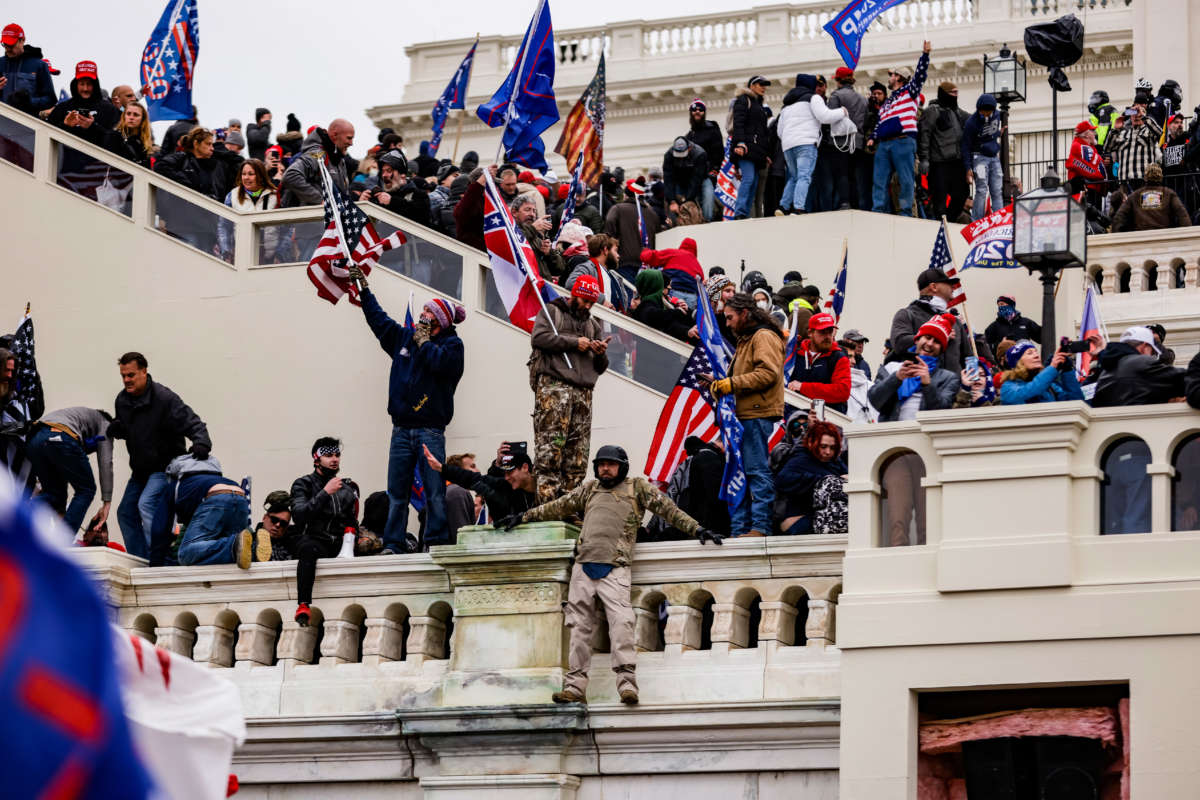In a legal filing made on Friday, the United States Department of Justice (DOJ) announced that it expects to make at least 100 additional criminal charges related to the January 6 breach of the Capitol building.
The violence of that day happened after former President Donald Trump held a rally outside of the White House at which he repeated false claims about election fraud and encouraged his loyalists to confront Congress while it was in session validating the results of the Electoral College.
The 100 additional criminal charges that the DOJ expects to make in conjunction with the Capitol attack add to the 316 individuals who have already been charged, the DOJ said. More than 900 search warrants have been executed since January 6, and more than 15,000 hours of surveillance and body camera footage related to the attack on the Capitol have been pored over.
The 100 additional charges have arisen in relation to a specific case involving a dozen members of the far right militia extremist group the Oath Keepers. Prosecutors said extra arrests are expected in order to justify a request to delay scheduling a trial date for members of that organization.
“The investigation and prosecution of the Capitol Attack will likely be one of the largest in American history, both in terms of the number of defendants prosecuted and the nature and volume of the evidence,” prosecutors said in their filing on Friday.
Twelve members and associates of the Oath Keepers have already been arrested on charges stemming from the events of January 6. According to those familiar with the DOJ’s goals, it is formulating a conspiracy case against the Oath Keepers’ founder, Stewart Rhodes, and other members of the group, as well.
Rhodes insists that he’s done nothing wrong, and that other members of his group went “off mission” by entering the Capitol without asking him. He further claims that the government is “trying to manufacture a nonexistent conspiracy” case against him.
“I didn’t say, ‘Don’t enter the Capitol.’ I never figured they would do that,” Rhodes has said.
A conspiracy case may indeed be difficult to prove. The government “tends to view conspiracies very broadly,” former federal prosecutor Peter Skinner said to The Washington Post. “You need an agreement to commit a crime, but you don’t need the actual commission of the underlying crime. But proving that the leaders agreed that the individuals would do something can be difficult, because they would have to show some kind of meeting of the minds.”
While activists on the left have long decried the racist bias in law enforcement that enables white supremacists to act with tacit approval from the police, many have also warned that increased arrests and incarceration won’t bring an end to white supremacist violence.
Writing in Truthout last month, activist Kay Whitlock argued that “souped-up hate crime laws and new ‘anti-domestic terrorism’ legislation” are “routinely manipulated by politicians and law enforcement/national security players who don’t want us to develop responses outside of the frameworks they already control.” Indeed, she added, these carceral solutions merely “expand systems of policing, surveillance and carceral control in ways that uphold structural white supremacist violence.”
Polls indicate that the broader U.S. populace is also skeptical about whether the hundreds of arrests and charges made in response to the Capitol breach will prevent future similar attacks on the democratic process.
According to polling from CNN/SSRS released on Friday, only 26 percent of voters nationwide believe that there will be a small likelihood of violence, like what was seen on January 6, in response to election results in the future. Conversely, 71 percent say the possibility of such violence happening is either “somewhat” or “very” likely to happen in the next few years.
Join us in defending the truth before it’s too late
The future of independent journalism is uncertain, and the consequences of losing it are too grave to ignore. To ensure Truthout remains safe, strong, and free, we need to raise $46,000 in the next 7 days. Every dollar raised goes directly toward the costs of producing news you can trust.
Please give what you can — because by supporting us with a tax-deductible donation, you’re not just preserving a source of news, you’re helping to safeguard what’s left of our democracy.
